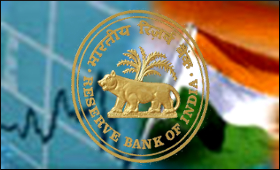|

|
RBI bans zero pc EMI option on goods buying through credit cards
|
|

|
|
| Top Stories |
 |
|
|
|
SME Times News Bureau | 26 Sep, 2013
To protect customer interest, the Reserve Bank of India Wednesday asked
banks to stop the zero per cent interest rate scheme for purchase of
consumer goods and said that no additional charges can be levied on
payment through debit cards.
In a notification, the central bank
said banks should not resort to any practice that would distort the
interest rate structure of a product as this "vitiates the transparency
in pricing mechanism which is very important for the customer to take
informed decision."
The RBI said the very concept of zero per
cent interest was non-existent and fair practice demanded that the
processing charge and interest charged should be kept uniform product
wise or segment wise, irrespective of the sourcing channel, since such
schemes only serve the purpose of alluring and exploiting the vulnerable
customers.
In the zero per cent EMI schemes offered on credit
card outstandings, the interest element is often "camouflaged" and
passed on to customer in the form of processing fee.
"Similarly,
some banks were loading the expenses incurred in sourcing the loan (viz
DSA commission) in the applicable rate of interest charged on the
product," said the bank.
The notification said that the only
factor that can justify differential rate of interest for the same
product, tenor being the same, was the risk rating of the customer,
which may not be applicable in case of retail products where the
interest is generally kept flat and is indifferent to the customer risk
profile.
With regard to subvention, it said the loan amount
sanctioned for the purchase should be after taking into account the
discount, rather than giving effect to the benefit by reducing the
interest.
Similarly, "If there is a moratorium period for
payment available, the benefit should be passed on to the customer by
ensuring that repayment schedule, including the interest servicing,
commence after the moratorium period only rather than adjusting it in
the interest."
Thus in principle, banks should not resort to any
practice that would distort the interest rate structure of a product as
this vitiates the transparency in pricing mechanism which is very
important for the customer to take informed decision, it said.
Discounts
on price or moratorium period for payment are often offered by the
dealers or manufacturers on their products to the customers while they
make the purchase by availing loans from banks.
In such
instances, it was the responsibility of the banks, who are using their
good offices to get the better bargain, to make the customers fully
aware of these benefits and also pass on the benefits to them fully and
indiscriminately while sanctioning loan for the purchase, it said.
On
levying additional fees on debit card transactions, RBI said there are
instances where points of sales levy fee as a percentage of the
transaction value as charges on customers who are making payments for
purchase of goods and services through debit cards.
"Such fee are
not justifiable and are not permissible as per the bilateral agreement
between the acquiring bank and the merchants and therefore calls for
termination of the relationship of the bank with such establishments."
"These
practices or products thwart the very principle of fair and transparent
pricing of products which behold customer rights and customer
protection, especially, in the more vulnerable retail segment," it said.
Such
practices violate, both in letter and spirit, various provisions of
master circular on interest rate on advances "and therefore, you (banks)
are advised to strictly desist from these practices hence forth," it
added.
|
|
|
| |
|
|
|
|
|
|
|
|
|
|
|
|
|
|
| |
| Customs Exchange Rates |
| Currency |
Import |
Export |
US Dollar
|
₹91.35
|
89.65 |
UK Pound
|
₹125.3
|
₹121.3 |
Euro
|
₹108.5
|
₹104.85 |
| Japanese
Yen |
₹58.65 |
₹56.8 |
| As on 19 Feb, 2026 |
|
|
| Daily Poll |
 |
 |
| What is your primary "Make or Break" expectation from the Finance Minister this year? |
|
|
|
|
|
| Commented Stories |
 |
|
|
|
|
|
| |
|